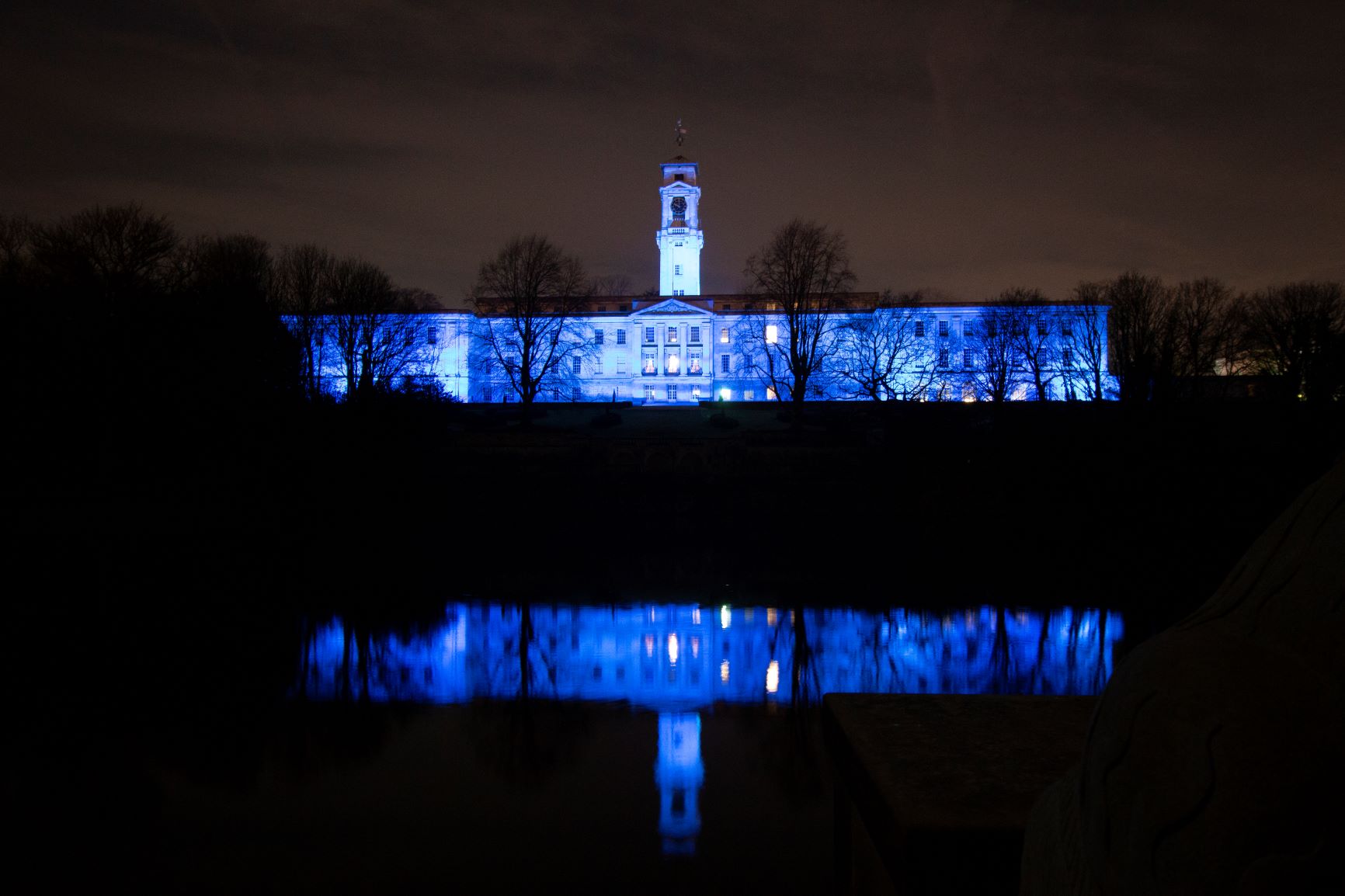
March 19, 2021, by Rob Ounsworth
World Water Day: valuing this priceless global resource
The University of Nottingham’s iconic Trent Building will be lit up in blue on the evening of 22 March – to mark World Water Day. This highlights our commitment to the UN Sustainable Development Goals. The theme of World Water Day 2021 is Valuing Water:
‘Water means different things to different people in different settings. By sharing all the different ways water benefits our lives, we can value water properly and safeguard it effectively for everyone. Valuing water appropriately is key to achieving the United Nations Global Goals.’
What does water means to you? How is water important to your home and family life, your livelihood, your cultural practices, your wellbeing, your local environment? By recording – and celebrating – all the different ways water benefits our lives, we can value water properly and safeguard it effectively for everyone.
Join us to discuss Sustainable Resources for the 21st Century City
Join us at the annual lecture hosted by Papplewick Pumping Station, which takes place on World Water Day. Sustainable Resources for the 21st Century City is part of a public lecture series from the University of Nottingham’s Institute for Policy and Engagement, and is supported by Water Works, a group of interdisciplinary researchers dedicated to providing solutions to the global challenge of protecting this priceless resource.
The lecture is open to all and takes place from 12.30 to 2pm, using the platform Microsoft Live Teams.
Among speakers from Severn Trent Water, Nottingham City Council and the Environment Agency is Dr Emily O’Donnell of the School of Geography, whose research is helping better protect cities like Newcastle and Nottingham from flooding while also making them greener, healthier and more pleasant places to live.
Find out more and book your place
Water Works: world-leading research
Professor Rachel Gomes of the Faculty of Engineering, is Head of the Food Water Waste Research Group and lead for the University Water Works Interdisciplinary Research Cluster.
Professor Gomes said: “Water is intrinsic to each of our lives. It is fundamental to how our societies, industries and natural environment function. Yet do we truly value water? Do we appreciate how water is used and underpin other resources and services? Are we aware of how water is reused, that ‘waste’ water is actually a resource and our actions can contribute to pollution and mismanagement of this resource? Do we know that over 2 billion people on our planet are still living without access to safe water?
“Our interdisciplinary Water Works researchers are developing innovative ways to manage our water resources, and how pollutants can be products, and we are understanding and mitigating flood risk. We are working locally and globally with stakeholders, such as supporting Nottingham as the first city to aspire to become carbon neutral.
“We have a growing water research network of 140 academics across all five faculties and international campuses. Through transdisciplinary research, we are bringing together our engineers, scientists, geographers, historians, health experts and many more, to pioneer new ways that ensure every person on our planet has access to the water they need to thrive.”
Here is a taster of the challenges the Water Works research network addresses:
Human-induced climate change shown to influence global river systems (Professor Simon Gosling)
First map of groundwater recharge in Africa will help sustain water supplies (Professor Murray Lark)
Litter provides habitat for diverse animal communities in rivers (Dr Matt Johnson and Hazel Wilson)
Number of people suffering extreme droughts set to double worldwide, new climate change study shows (Professor Simon Gosling)
Fighting for Water: Resisting Privatization in Europe (Zed Books) will be published on 17 June 2021 (Professor Andreas Bieler)
Demonstrating how urban flood risk management based on blue-green approaches and infrastructure can deliver both sustainable flood risk management and multiple co-benefits that are valued by urban communities (Professor Colin Thorne, Dr Emily O’Donnell)
Tsunamis due to ice masses: Different calving mechanisms and linkage to landslide-tsunamis (Dr Valentin Heller)
Is the Sponge City Program (SCP) transforming Chinese Cities? (Dr Faith Chan)
Dairy farm – waste to resource (Prof Rachel Gomes and Chris Lanyon)
Taking the waste out of water (Dr Arpita Vats, Prof Rachel Gomes and Andrea Garduno Jimenez.
Our University’s water commitment
The university’s Go! Your Sustainable Choices Matter campaign underlines our commitment to tackle climate change. Everyone can make a difference, and even the smallest actions add up to big impacts. Sign up to the new Green Rewards platform to get started. To find out more, subscribe to our newsletter or follow us on social media: Twitter, Instagram, Facebook
Water use 2019/2020
Over the last year we have seen a reduction in both our energy (3%) and water (22%) use across the university. This is primarily as a result of lockdown, as well as some leak detection work and improvements. Management of our water consumption and surface water is essential for future resilience and is being progressed through our Estate Development Framework.
How you can reduce your water consumption
Catch the drop – please inform estates@nottingham.ac.uk to report water leakages, from leaky taps to large scale leakages.
Don’t leave taps running – when filling up the kettle, washing your pots etc – only use what you need
Water great idea – if you have an idea of how we can save more water at the University, please email sustainabilty@nottingham.ac.uk
Visit WasteNott to find out more.
No comments yet, fill out a comment to be the first


Leave a Reply